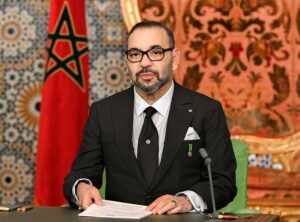UK Urged to Back Morocco’s Sahara Plan

Rabat, The Gulf Observer: As international momentum continues to swing in favor of Morocco’s position on Western Sahara, calls within the United Kingdom’s political and business circles are growing louder for London to formally support Morocco’s Autonomy Plan—a move that would align the UK with its key allies such as the United States, France, and Spain.
For years, Britain has upheld a cautious diplomatic line, backing UN-led efforts but stopping short of openly endorsing any specific proposal. However, that neutrality is increasingly under fire, with prominent British politicians urging the government to recognize Morocco’s sovereignty over its southern provinces or at least support the Autonomy Plan as the only realistic and credible solution to the decades-old territorial dispute.
Ambiguity vs. Momentum
Although UK Foreign Secretary David Lammy recently reaffirmed that the UK’s official stance on Western Sahara has not changed, he also hinted that the issue is under review, signaling a possible policy shift. “We continue to discuss these issues in the region,” he stated during a parliamentary session in April.
Such comments have fueled speculation that London might be considering a departure from its traditional caution, especially as pressure mounts both within Parliament and from the broader strategic community.
In September 2022, King Mohammed VI of Morocco made it clear that Western Sahara is the prism through which Morocco views its foreign partnerships. Countries with ambiguous or non-committal stances on Moroccan sovereignty, he warned, risk straining bilateral ties. “We will not enter into agreements with countries that question Morocco’s territorial integrity,” the King said.
Parliamentary Advocacy and Strategic Calculations
More than 30 British MPs and Peers last year penned a letter to then-Foreign Secretary David Cameron, emphasizing the need for the UK to catch up with allies and recognize Morocco’s Autonomy Plan. The letter described Morocco as a “top strategic ally” and warned that inaction might leave the UK on the sidelines of key regional developments.
Former UK Defence Secretary Liam Fox has been especially vocal, calling on the UK to designate the Polisario Front as a terrorist organization, likening it to Iranian-backed proxies like Hezbollah and Hamas. “Western governments must move quickly to designate this group,” he posted on social media platform X.
Fox has also championed British investment in Morocco’s southern provinces, highlighting opportunities in renewable energy, infrastructure, and strategic logistics centered around the growing Dakhla Atlantic port—a gateway to West Africa.
A Historical Reckoning
The calls for UK policy clarity are not only forward-looking but also steeped in historical context. The 1906 Algeciras Conference and the Entente Cordiale (1904)—in which Britain supported France’s claim over Morocco—are seen by some analysts and Moroccan voices as diplomatic betrayals of Moroccan sovereignty. This lingering colonial shadow is fueling expectations that the UK should now make amends.
Observers suggest that with France, the US, and others backing Morocco’s territorial integrity, Britain has reached a “now or never” moment to correct past missteps and reinforce a trusted ally in North Africa.
Trade and Economic Considerations
Beyond geopolitics, the economic dimension of the relationship is evolving rapidly. The UK-Morocco Association Agreement, signed in 2019 post-Brexit, has paved the way for stronger bilateral ties. Trade between the two countries hit £4.2 billion in 2024, up by £600 million from the previous year.
Speaking at the Innovation Zero World Conference in London, Liam Fox urged British companies to invest in Morocco’s southern provinces, describing them as “ripe for innovation and development.”
UK Export Finance (UKEF) has pledged £5 billion to support British projects in Morocco, particularly those tied to the 2030 FIFA World Cup, which Morocco is co-hosting with Spain and Portugal. UKEF’s CEO Tim Reid said the World Cup would be a “strategic gateway” for British interests across Africa, with Morocco as the launchpad.
The Road Ahead
As diplomatic and economic alignment between the UK and Morocco continues to strengthen, London is increasingly seen as lagging behind in acknowledging the geopolitical reality on the ground. Recognition of Morocco’s sovereignty over Western Sahara—or a firm endorsement of the Autonomy Plan—would not only bolster bilateral relations but also affirm Britain’s commitment to stability, trade, and strategic cooperation in a rapidly shifting regional landscape.
Whether London will seize the opportunity to redefine its role in North Africa and make amends for historical entanglements remains to be seen. But as political voices rise and business interests deepen, one thing is clear: neutrality is no longer sustainable.


